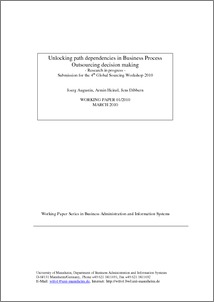|
Unlocking path dependencies in Business Process Outsourcing decision making
Augustin, Joerg
;
Heinzl, Armin
;
Dibbern, Jens
![[img]](https://madoc.bib.uni-mannheim.de/2939/1.hassmallThumbnailVersion/GSW10_Unlocking_path_dependencies_in_BPO_decision_making_by_Augustin_et_al.pdf)  Vorschau |
|
PDF
GSW10_Unlocking_path_dependencies_in_BPO_decision_making_by_Augustin_et_al.pdf
- Veröffentlichte Version
Download (811kB)
|
|
URL:
|
https://ub-madoc.bib.uni-mannheim.de/2939
|
|
URN:
|
urn:nbn:de:bsz:180-madoc-29390
|
|
Dokumenttyp:
|
Arbeitspapier
|
|
Erscheinungsjahr:
|
2010
|
|
Titel einer Zeitschrift oder einer Reihe:
|
Working Papers in Business Administration and Information Systems
|
|
Band/Volume:
|
01/10
|
|
Sprache der Veröffentlichung:
|
Englisch
|
|
Einrichtung:
|
Fakultät für Betriebswirtschaftslehre > ABWL u. Wirtschaftsinformatik I (Heinzl 2002-)
|
|
MADOC-Schriftenreihe:
|
Area Information Systems and Institute for Enterprise Systems > Working Papers Lehrstuhl für ABWL und Wirtschaftsinformatik (Heinzl) (bis 2011)
|
|
Fachgebiet:
|
330 Wirtschaft
|
|
Normierte Schlagwörter (SWD):
|
Prozesskette , Outsourcing , Allokation
|
|
Freie Schlagwörter (Englisch):
|
Business Process Outsourcing , path dependence theory , process theoretic logic , lock-in effect , contract extension , provider change , backsourcing
|
|
Abstract:
|
The objective of this study is to examine the decision process and outcome at the end of an outsourcing contract and how this process evolves over time. Despite the vast amount of literature in IS Outsourcing, little is known about the determinants, the process, the context and the outcome of the last phase in an outsourcing relationship. In order to better understand the complexity and dynamics of the contract termination or extension, we will apply a process-theoretic logic. It draws on Path Dependence Theory which suggests that path decisions are rooted in circumstances or events that take place in precedent phases of the outsourcing process. Based on the results of 21 Business Process Outsourcing (BPO) cases, our findings confirm the existence of significant path-dependencies which lead to sub-optimal economic results. Once a business process has been outsourced, the client organizations get literally locked-in the chosen path and tend to continue the contract with the vendor, even if initial expectations did not accrue. In order to better understand the pattern of such path trajectories, a process model will be presented which integrates distinct stages of the service delivery phase, the expectations of the client organizations, and internal as well as external stimulation events that lead to expectation gaps. These stimulation events are necessary but non-sufficient conditions for breaking the path. In addition, significant resource commitments from the clients’ perspective are required for breaking the path. If these commitments are not be made, the lock-in situation prevails, i.e. back-sourcing or a vendor change is unlikely to take place.
|
 | Das Dokument wird vom Publikationsserver der Universitätsbibliothek Mannheim bereitgestellt. |
 Suche Autoren in Suche Autoren in
Sie haben einen Fehler gefunden? Teilen Sie uns Ihren Korrekturwunsch bitte hier mit: E-Mail
Actions (login required)
 |
Eintrag anzeigen |
|
|



 Suche Autoren in
Suche Autoren in